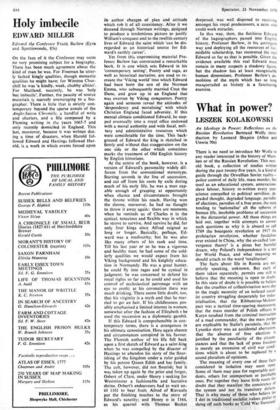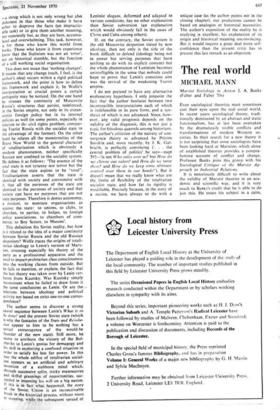What in power?
LESZEK KOLAKOWSKI
An Ideology in Power: Reflections on the Russian Revolution Bertrand Wolfe intro- duction by Leonard Shapiro (Allen and Unwin 70s) There is no need to introduce Mr Wolfe to any reader interested in the history of Marx- ism or of the Russian Revolution. This new- old book, a collection of studies written during the past twenty-five years, is a kind of guide through the Orwellian Soviet reality— police control of daily life, mass murder, lies used as an educational system, annexations. slave labour, history re-written every year. science compelled to political servilism. de- graded thought, degraded language, parodies of elections, parodies of a free press, the state tending to 'nationalise' all the spheres of human life, insoluble problems of succession in the dictatorial power. All these things are laid out, together with attempts to answer such questions as why it is absurd to call 1789 the bourgeois revolution or 1917 the proletarian revolution, whether feudalism ever existed in China, why the so-called 'con- vergence theory' is a pious but harmful dream, why Poland's independence is a test for World Peace, and what meaning we should attach to the word 'totalitarian'.
The facts about life in Russia are not. strictly speaking, unknown. But each of them taken separately, permits one still to believe that the meaning is open to doubt. In this state of doubt it is possible to believe that the cruelties of collectivisation were due to the tragic necessity of an isolated social- ist country struggling desperately for indus- trialisation, that the Ribbentrop-Molotm pact was a tactical time-sparing manoeuvre. that the mass murder of Polish officers in Katyn resulted from the criminal instruction of a mad commander, that the mass purges are explicable by Stalin's paranoia, that the Lysenko story was an accidental aberration. that the absence of free elections is justified by the peculiarity of the circum- stances and that the lack of press freedom is merely an extension of civil war condi- tions which is about to be replaced by a sound pluralism of opinions. The meaning of every one of these facts considered in isolation may seem open. Some of them may pass for regrettable acci- dents, others for unimportant or justifiable ones. Put together they leave little room for doubt that they manifest the consistency of
the system and not its transitory defects' That is why many of those who believe (as I do) in traditional socialist values prefer to, shrug off such books as 'Cold War literature
—a shrug which is not only wrong but also dishonest in that those who make it have either to disprove the facts (an impractic- able task) or to give them another meaning, not separately but, as they are here, accumu- lated and overwhelming. This task, however, is for those who know this world from books. Those who know it from experience know that the Stalinism was not an 'error', not an historical stumble, but the function of a still working social organisation.
This does not mean that 'nothing changes'. It means that any change (such, I feel, is the author's idea) occurs within a rigid political framework, and the point is how to define this framework and explain it. In Wolfe's interpretation at crucial points a certain ambiguity may be noticed. On the one hand he stresses the continuity of Muscovite Russia's structures that persist, reinforced, in the Soviet empire, not only in its expan- sionist foreign policy but in its internal policies as well (in some points, especially in relation to the civil rights problem, compar- ing Tsarist Russia with the socialist state to the advantage of the former). On the other hand he relates all the monstrosities of the Brave New World to the general character of totalitarianism which is obviously a modem phenomenon, neither specifically Russian nor confined to the socialist system. He defines it as follows: The essence of the total state is not tyranny nor terror but the fact that the state aspires to be "total". Totalitarianism asserts that the state is identical with society and coextensive with it, that all the purposes of the state are identical to the purposes of society and that society can have no purposes that are not state purposes. Therefore it denies autonomy, a fortiori, to nonstate organisations as against the state: to unions, to clubs, to churches, to parties, to lodges, to foreign policy associations, to chambers of com- merce, to Boy Scouts, to Masons'.
This definition fits Soviet reality, but how is it related to the idea of a major continuity between Soviet Russia and the old Russian despotism? Wolfe traces the origins of totali- tarian ideology to Lenin's version of Marx- ism. stressing especially his theory of the party as a professional apparatus and the need to impart proletarian class consciousness into the working classes from outside. But he fails to mention, or explain, the fact that the last theory was taken over by Lenin ver- batim from Kautsky. Was Kautsky simply inconsistent when he failed to draw from it the same conclusions as Lenin. Or are the relations between ideology and political activity not based on strict one-to-one corres- pondence?
The author seems to discover a strong causal sequence between Lenin's What is to he done? and the present Soviet state (which is why the fantasies of the State and Rev. olu- lion appear to him to be nothing but a casual extravagance of the would-be founder of the new state). Still more, he seems to attribute the victory of the Bol- sheviks to Lenin's genius for demagogy and his skill in exploiting a confused situation in order to satisfy his lust for power. In this way the whole edifice of totalitarian social- ism appears as an artificial and arbitrary invention of a stubborn mind which, through. successive splits, tricky manoeuvres and skilful graspings of opportunities, suc- ceeded in imposing his will on a big nation. If this is in fact what happened, the story of the Soviet Union is an inconceivable break in the historical process, without roots or meaning, while the subsequent spread of
Leninist slogans, deformed and adapted to various conditions, has no other explanation than Soviet subversion (an explanation which would obviously fail in the cases of China and Cuba among others).
lf, on the contrary, the Soviet system is the old Muscovite despotism tinted by new ideology, then not only is the title of the book difficult to defend (ideology being not in power but serving purposes that have nothing to do with its explicit content) but the whole phenomenon of Leninism becomes unintelligible in the sense that nobody could hope to prove that Lenin's conscious aim was the revival of the weakening Tsarist empire.
I do not pretend to have any alternative explanatory hypothesis. I only pinpoint the fact that the author hesitates between two incompatible interpretations each of which is indefensible in its pure form, and a syn- thesis of which is not advanced. Since, how- ever, any valid prognosis depends on the validity of the diagnosis, this is not just a topic for frivolous quarrels among historians. The author's criticism of the naivety of con- vergence theory as advanced by Pitirim Sorokin and, more recently, by J. K. Gal- braith. is perfectly convincing ('. . . the central problem of politics' he says—page 392—'is not Who rules over us? but How do we choose our rulers? and How do we tame them? and How do we keep some ultimate control over them in our hands?'). But it doesn't mean that we really know what are the limits of flexibility of the totalitarian socialist state, and how far its rigidity is modifiable. Precisely because, in the story of a nation, we have always to do with a
unique case (as the author points out in the closing chapter), our predictions cannot be based on analogies or historical necessities. The author's exposition of the reality he is studying is excellent, his explanation of its origin and historical meaning unconvincing. But it would require a great deal more self- confidence than the present critic has to present this last remark as an objection.















































 Previous page
Previous page